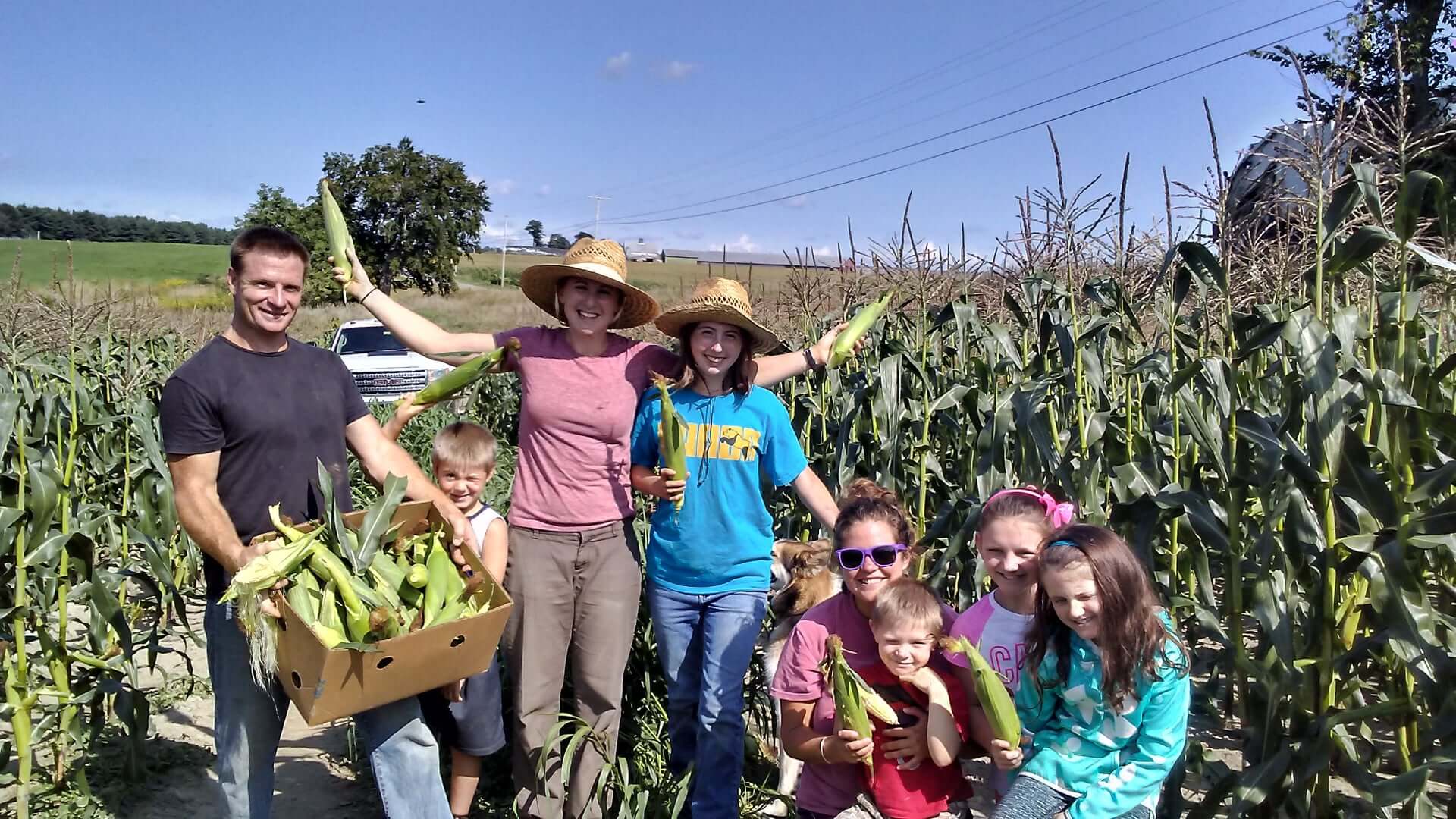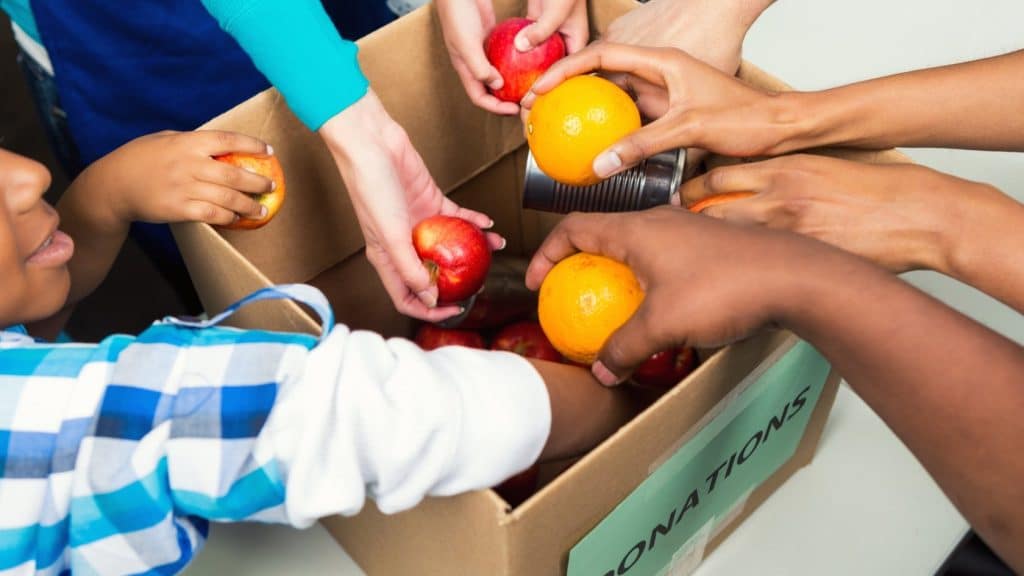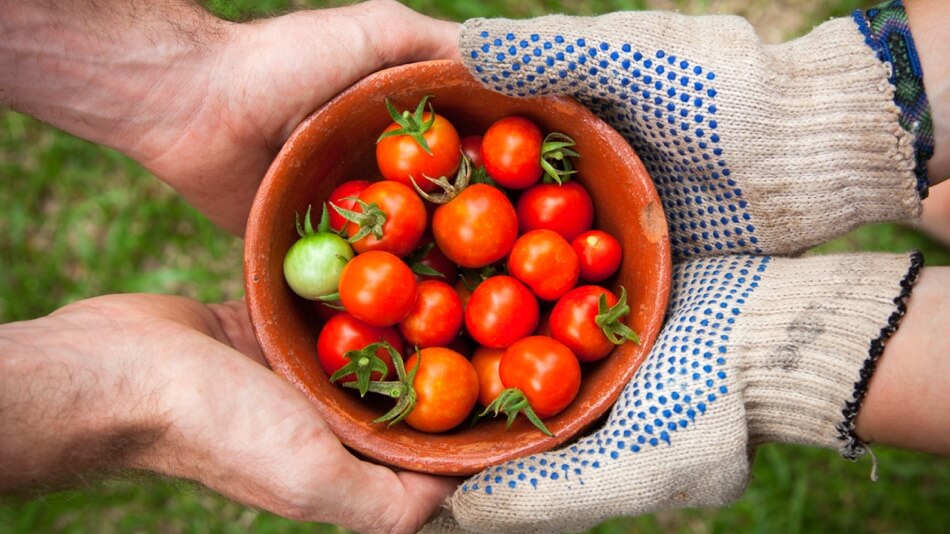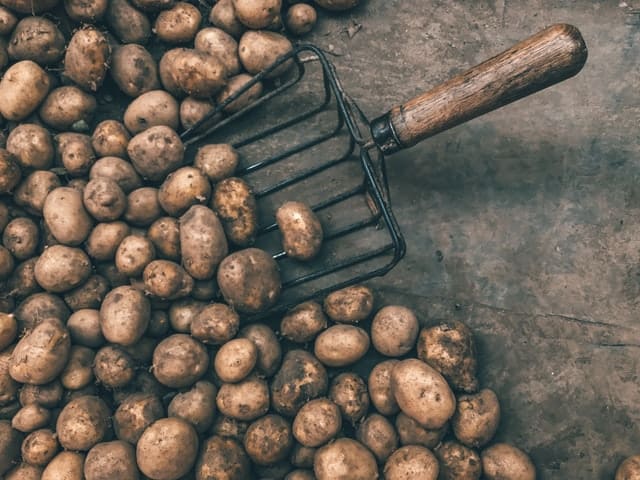Farmer Feature: Veggies For All, a project of the Maine Farmland Trust. Interview of with Sara Trunzo.
As part of out continuing Farmer Feature Series, today we’re featuring an incredible program in Maine called Veggies For All which is project of the Maine Farmland Trust. Veggies for All (VFA) is a food bank farm that works to relieve hunger by growing vegetables for those in need, while collaborating with partners to distribute and increase access to quality and nutritious food. Read our interview of Sara Trunzo, the Director of Veggies For All, and be inspired by the creative and innovative strategies they are using to reduce hunger and malnutrition in their community.
AmpleHarvest.org: Who came up with the idea of Veggies for All and how did it get started?
Sara Trunzo: Veggies For All (VFA) was started in 2007 by a few beginning farmers in the Unity, Maine area. Along with a desire to hone their agricultural skills, they recognized the great potential for local agriculture to relieve hunger in our region. Our current farm manager, Tim Libby, was one of those founders. I was doing real similar work from the perspective of Unity College’s sustainability department and was helping the local food pantry develop education and outreach resources. We joined forces in late 2009. Since then we’ve grown and distributed over 75,000 pounds of vegetables to our neighbors in need.
AmpleHarvest.org: How much land are you growing on and what are you growing?
Sara Trunzo: This year we are stewarding about 4 acres of vegetables. Some of that acreage is located on Unity College’s campus and some is around our town on private land which members of the community have given us access to at no cost. They are all thrilled to put their property to use for this purpose. We always focus on traditional New England, Fall hardy crops, including: winter squash, carrots, cabbage, potatoes, and onions. We choose these items based on their accessibility to clients (i.e. they are recognizable, common, and easy to use), their ability to store well into winter, their sturdy ability to withstand handling by volunteers in food pantries, AND their schedule that caters toward the availability of our volunteers.
We grow a handful of miscellaneous crops, too, for use in a summer veggie share we provide a daycare center, to support fundraising, for our food pantry volunteers to blanch and freeze in their kitchen. This year, in an unexpected twist due to a generous donation of materials, we are cultivating a half-acre each of beets and sweet peppers.
AmpleHarvest.org: Who is doing the farming? Are they volunteers? What motivates them to keep working and serving others?
Sara Trunzo: We are big believers in the idea that farming is a profession. We love working with gardeners and hobby farmers to get produce donated to the food pantry- but VFA has been successful, productive, and improved our soils because we hire a trained veggie grower to fill the farm management role.
We also use TONS of volunteers. We’ve had hundreds of people join us in literally thousands of volunteer hours since 2009. We have a couple superstar vols (you know who you are!) who give us weekly field-work support: an energetic retiree, a mom and community organizer, an agriculture student.
Our largest and most consistent stream of volunteers is from Unity College. An environmental college with a strong community-orientation, the students are excited to get out in the field and get their hands dirty. We could not pull off our large transplanting and harvesting demands without them.
AmpleHarvest.org: Where is the food going?
Sara Trunzo: Our veggies go to a large (for our neck of the woods) food pantry, the Volunteer Regional Food Pantry (VRFP), which serves about 800 people in the greater Unity area. The VRFP acts as a distribution hub for 9 smaller pantries in central Maine through the mid-Maine food pantry coalition. We reach a total of 1,500 people through this collaborative distribution effort.
AmpleHarvest.org: How do you think the work of VFA has helped the community it serves?
Sara Trunzo: We know that getting more healthy food into our neighbors’ kitchens helps them make ends meet, nourish their families, and feel supported. Beyond that- we’ve been aggressive about getting the issue of rural hunger into more conversations and on more people’s minds. We work in a community that prides itself on gorgeous farmland, entrepreneurial farmers, and opportunities in food. But like most rural communities with facing poverty- someone may live next to a vibrant farm, but not be able afford to buy healthy food from that farmer. It’s bad for the farmer, who needs clients, and bad for the consumer, who needs access to better food- and it’s the result of a broken and unjust food system. Great efforts are being made to develop win-win pathways between farms and consumers- but in the mean time we meet the immediate need for veggies in the homes of the food insecure. We also hope that this helps those consumers develop a taste for local, seasonal produce so they are primed to become farm customer in the future should they choose to be.
AmpleHarvest.org: What are you hopes for the future of VFA?
Sara Trunzo: Locally, we’d love to get better at data collection, analysis, and assessment to strategically increase our impact. We’ve got a lot of good community support and momentum, but if we are able to apply that to key leverage points and pull resources toward key actions- we believe we could measurably increase the health and food security of our community. We also hope optimize our operation by acquiring some key infrastructure and equipment- a farm truck, compost spreader and tractor tool bar- mounted cultivation tools, for example.
As of March 2014, VFA became part of Maine Farmland Trust (MFT). MFT works to protect farmland, and to keep farming in Maine viable and vital. Because we are now part of a statewide organization, it is a great opportunity to bring our food bank farming model to other rural communities that have similar needs and assets. My hope is that, in addition to putting good food into the emergency food system, future food bank farms will also provide solid, career-building positions for beginning farmers so they can develop their farm management and customer service skills. We think the model can work in any rural community that has good land, excitement for agriculture, and supportive community partners.
AmpleHarvest.org: How does AmpleHarvest.org play a roll to help?
Sara Trunzo: AmpleHarvest.org is a great tool for outreach, as well as, on-the-ground coordination of getting better food to hungry people. You all have both elevated the discourse about hunger and changed the conversation in an important way: The food pantry-finder empowers anyone who is frustrated by food insecurity to pitch-in immediately in his or her own community by making a personal connection. It is a great people connector! We hope that gardeners and farmers who are inspired by the work of Veggies For All and similar initiatives, will use the pantry finder to make a connection with their local hunger relief organizations.
About Sara Trunzo:
Sara is a member of Maine Farmland Trust’s Farm Viability staff and the Director of Veggies For All. Sara has experience in sustainable agriculture education, community organizing, and has provided leadership to numerous groups working on food system and hunger relief issues. Sara is vice-chair of the Volunteer Regional Food Pantry, president of the Waldo County Cooperative Extension executive committee, advisor to the Maine Community Foundation’s Waldo County Fund, member of the Maine Food Strategy steering committee, and board member for Unity Barn Raisers. She is an active participant in the Town of Unity’s comprehensive planning process, co-hosts and produces the public affairs program Mid-Coast Currents on WERU Community Radio, and is an Environmental Leadership Program senior fellow. Sara’s focus is on healing hunger in the context of fixing the food system, especially for rural citizens. A Jersey girl by birth and a rural resident by choice- she loves good food, bad country music, big earrings, small farms.



